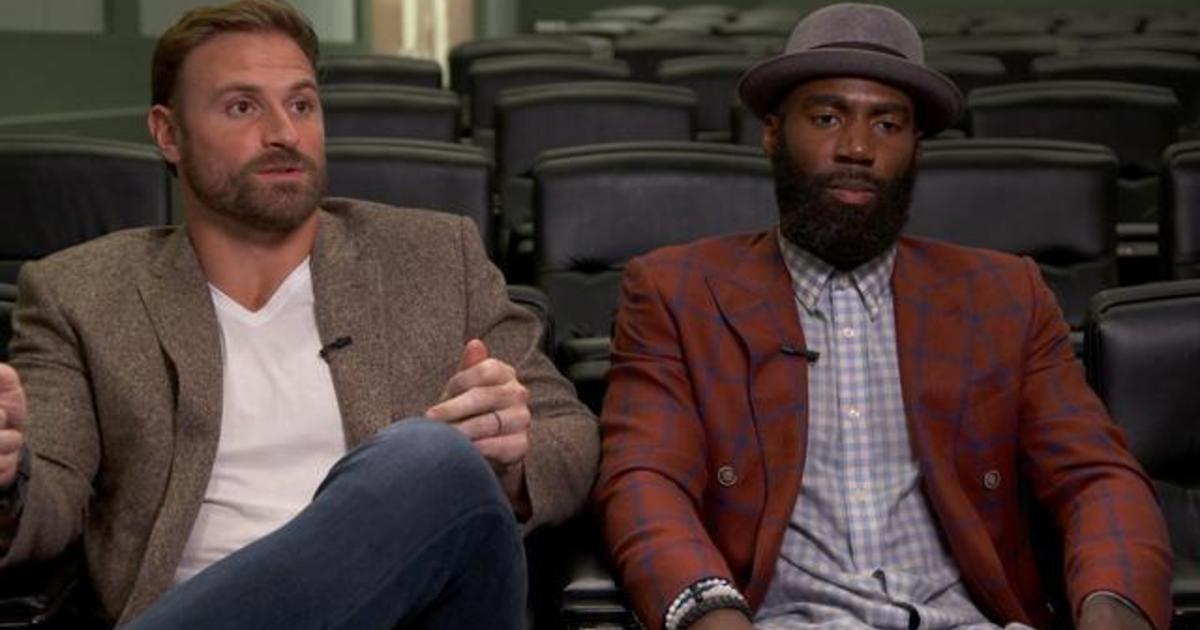
Two years ago, Colin Kaepernick took a knee during the national anthem to spotlight social injustice and as the silent protest spread, so did an uproar. But one group of NFL players has been quietly working to enact change off the field.
“CBS This Morning: Saturday” co-host Dana Jacobson sat down with Super Bowl champions Chris Long and Malcolm Jenkins, who believe the controversy has drowned out some of the real work that is being done.
“What Colin did was find out a way to bring up the conversation and force a conversation… It’s up to us to stay focused…to make sure that the issues and topics stay at the forefront…that is what this all started from and that’s what we’ll continue to fight about,” Jenkins said.
On the first Sunday of the NFL season, Jenkins called a “listen and learn” session in Philadelphia, a meeting with business, community, and government leaders to discuss bail reform and jobs. He asked everyone at the table for help.
“We’re learning the ins and outs of our justice system…and changing minds as we go,” Jenkins said. “It’s really not that tough of a change. When you look at politics, it really comes down to priority. And we’ve talked to lawmakers all over the place that would agree that a lot of these reforms need to change, would agree that things are unfair, are a little unjust. But if voters aren’t clamoring about it, then it’s not high enough on the priority to change things.”
Two years ago NFL players formed an alliance to take the sideline protests to state capitals across the country. This past off-season, the group, now officially known as the Players Coalition, successfully lobbied for criminal justice reform bills in three states.
In April, Massachusetts raised the juvenile detention age from seven to 12. In May, the Louisiana state senate passed a law restoring voting rights to people convicted of a felony who’ve been on probation or parole for five years. In June, players successfully lobbied Pennsylvania lawmakers in Harrisburg to pass the Clean Slate Act, which seals the records of people with misdemeanors after 10 years, along with those arrested but not convicted of a crime.
Chris Long is one of Jenkins’ teammates working alongside him for change, including donating the salary from his final 10 games last season to charity.
“The three pieces of legislation…this is real substantive stuff in three different markets all around the U.S.,” Long said.
“Once we were able to lend our platform, our voices and be able to sit down with legislators, it made a big difference. And so that’s why we laugh when people say, ‘stick to the sports,’ because we see firsthand how much impact we can have,” Jenkins said.
But not everyone has been listening. Jenkins was compelled to hold posters in front of his locker this summer, highlighting issues like the disproportionate number of African Americans shot by police, or the half million people in jail because they can’t afford to make bail.
“It just sends the message that we have to stay on topic because we’re purposely choosing to overlook what it is that players have been even fighting for. Because we’ve been very articulate and very patient and consistent with police brutality, systemic racism, education, housing. And yet, we’ll continuously hear this dialogue ‘players don’t know what they’re doing’ or ‘they’re not organized,’ or, ‘they’re anti-military,'” Jenkins said.
“And those statistics and those things that are on those poster cards…people don’t want to hear about it. That literally left people no choice but to air that,” Long said.
The NFL is lending its backing to the Players Coalition with a social justice partnership. Earlier this month Commissioner Roger Goodell attended a listen and learn session in New Orleans and the league has pledged $89 million in support.
“We also want their platform and we want their voice. And the same way that they highlight issues like breast cancer for an entire month or ‘Salute to Service’ or all of these other initiatives that we’ve seen them promote and put their weight behind,” Jenkins said of the NFL.
Asked if what he’s doing is good for the game of football, Jenkins replied, “Not my concern.”
“I mean, we talk we talk about it…Football provides a livelihood for not only us but the other 2,000 players that are in the league and those to come and those who came before us. So we never want to do anything that’s going to damage the game…but at the end of the day lives of everyday Americans are more important than my ability to make a living,” Jenkins said.

